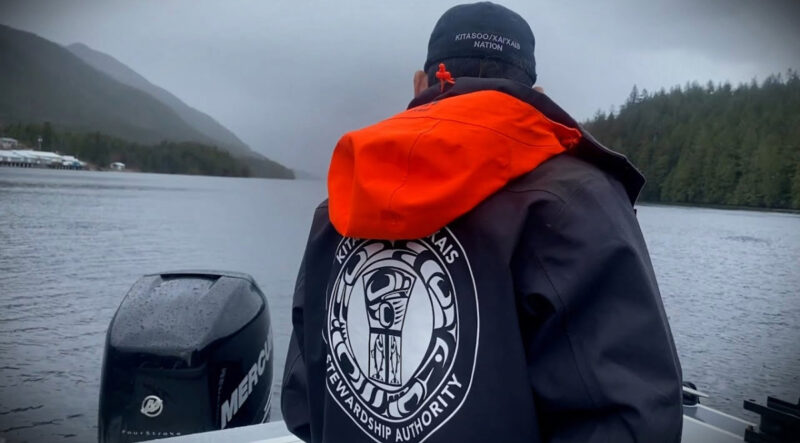First Nation develops ‘Innovation Plan’ for aquaculture in its traditional territory
First Nation’s plan is a pioneering framework for sustainable finfish aquaculture that integrates stewardship of natural resources with community-led economic development.
By Fabian Dawson
SeaWestNews
Developed using over 20 years of scientific research and centuries of traditional knowledge, the Kitasoo Xai’xais First Nation has established an ‘Innovation Plan’ for the sustainable development of the finfish aquaculture sector in its traditional territory.
Some details of the Kitasoo Xai’xais Finfish Aquaculture Innovation Plan were outlined in a letter from the First Nation to Prime Minister Justin Trudeau as the government considers renewing the licences of dozens of salmon farms in British Columbia, pending a transition process for the industry.
The National Post reported that Fisheries and Oceans Minister Diane Lebouthillier will put forward a plan next week to renew the existing licences of open net-pen Atlantic salmon farms for another eight to 10 years, giving the sector time to transition to systems that reduce interaction between wild and farmed salmon.
Bowing to demands from activists, who have mounted a campaign to discredit all government science that shows salmon farming in BC poses less than a minimal risk to wild stocks, the Liberal government has already shutdown 40% of salmon farms since 2020.
Before the shutdowns the salmon farming sector was the largest agri-food export in British Columbia. The sector employed approximately 6,500 people, produced close to 500 million salmon meals per year, received inputs from over 1,000 individual suppliers and had an economic value of $2 Billion.
The aquaculture detractors, including some cabinet ministers, have also been signalling that the government should ignore the rights of First Nations, who see salmon farming in their traditional territories as a pathway for economic reconciliation. Currently in BC, all the existing salmon farms are supported by the First Nations communities that they operate in.
The Coalition of First Nations for Finfish Stewardship, which is fighting to retain traditional rights to farm fish, has also called for long term licence reissuances for the salmon farms in the territories of its member nations, pending the transition process.
The coalition said the activists are spouting “misinformation about salmon farming in our territories and attempting to erase the sovereign rights and title of over a dozen coastal Nations in B.C. to suit an activist-driven agenda based on activist science.”
It recently released a comprehensive report, to reinforce the socio-economic importance of the sector and stressed that the future of salmon farming in BC must be determined by First Nations who want to farm fish in their traditional territories.
The ‘scientific textbook’ called Modern Salmon Farming in British Columbia: A Review, is also aimed at closing the knowledge gaps about the industry and counter the campaign of disinformation by anti-salmon farming opponents.
The Kitasoo Xai’xais, which is a member of the Coalition began farming and processing salmon independently in their waters in the late 1980s. Over 50 per cent of the Kitasoo Xai’xais’ revenue today is derived from their salmon farming partnerships, all while conserving over 52 per cent of their territory through their Great Bear Sea and Rainforest initiatives.
The First Nation aquaculture pioneer was recently awarded the prestigious Blue Park Award, for exceptional marine biodiversity conservation – a testament to the indigenous community’s stewardship of its traditional territories.
In the letter to Trudeau, Isaiah Robinson, deputy chief councillor of the Kitasoo Xai’xais Nation said there is a consensus among stakeholders and First Nations on the need for new incentives to drive technology and innovation that will enhance sustainability and increase public support for the sector.
He said the Innovation Plan, part of the Kitasoo Model, is a pioneering framework for sustainable finfish aquaculture that integrates stewardship of natural resources with community-led economic development.
“It not only addresses political and public concerns regarding the salmon farming industry but also sets a foundation for a sustainable and prosperous future in finfish aquaculture, reinforcing our ability to balance environmental stewardship, economic development, and community resilience,” the letter states.
“We, the Kitasoo Xai’xais, have continuously asserted our Rights and Title authority in our traditional territory and have invited the Department of Fisheries and Oceans (DFO) to engage in collaborative efforts to gain insights into our forward-thinking approach to industry management.
“At times, this dialogue with the DFO and the Government of Canada has been frustrating and one- sided. Today, we are no closer to understanding the federal government’s direction in finalizing a “responsible transition plan.”
“However, we are certain that failure to renew current salmon farming licences will put our Nation at risk, and will result in annual economic losses approximated at $2.82 million in economic output, $2.8 million in employment income, and 60 jobs within the Kitasoo Xai’xais Nation.”
(Image courtesy of the Kitasoo Xai’xais shows a ‘water guardian’ in the First Nation’s traditional territory)

